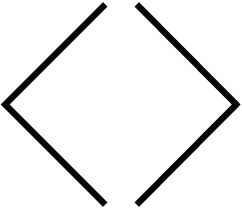The artists of the 2020/2022 Consortium Commissions are Deena Abdelwahed, Dina Mimi, Haig Aivazian, Inas Halabi, Joe Namy, Lydia Ourahmane, Ma’an Abu Taleb, and Makkimakuk. The artists are being presented in partnership with Alkantara Festival (Lisbon), Ancienne Belgique (Brussels), De Appel (Amsterdam), Haus der Kulturen der Welt (Berlin), Kunstenfestivaldesarts (Brussels), Portikus (Frankfurt), The Renaissance Society (Chicago), The Showroom (London), and Spielart Festival (Munich).
About the artists and their projects
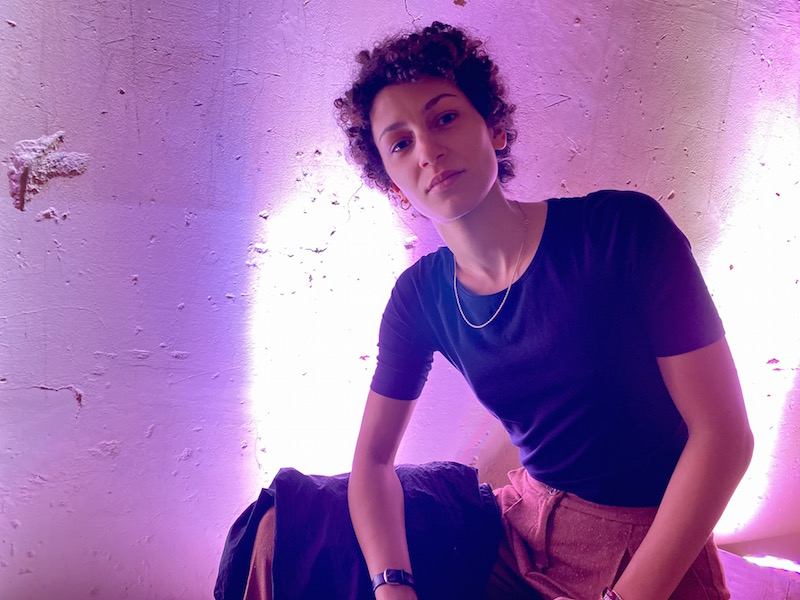
Deena Abdelwahed (b. 1989) is a Tunisian producer and DJ. She moved to France at the age of 26, after making a name for herself in Tunisia, and as part of the Arabstazy Collective. Her hybrid DJ sets, at the forefront of subcultures, including her DJ set at Sonar in 2017, propelled the young Tunisian into the clubbing universe’s most demanding spheres (Boiler Room, Concrete, Room For Resistance, Säule/Berghain). As a producer, she was the creator of All Hail Mother Internet, an acclaimed performance at the CTM Berlin Festival. Her first EP Klabb, released in early 2017 on InFiné, was met with critical acclaim on the blogosphere and electronic media. That same year, she collaborated on the tracks “Plunge” and “An Itch” on Fever Ray’s second album. Deena’s first album Khonnar, released in 2018, has shifted the epicentre of contemporary electronic music south. In January 2020, she released a new EP, Dhakar.
The selected proposal:
The aim of this project is to create and release an original and unique approach to the form of a mixtape, in which Deena collaborates with popular artists from the 2010s alternative music scene in the Arab world. Her aim is to create works that have a contemporary Club Music aesthetic which include elements that are relevant to the style and background of each collaborating artist. Khyam Allami, composer and founder of Nawa Recordings, will assist her with the musical research process, focusing on the re-appropriation of Western music technology in order to render Arabic musical culture including: how to digitally express authentic Arabic grooves, how to render the subtleties of Arabic microtonal melodies, and how to create music that will interact with club goers on the dance floor without using the Western solutions of today’s conventional club music. The outcome will be the product of research into the authenticity of Arabic dance music and its presentation in a futurist form.
Deena will be presenting at Ancienne Belgique in December 2021 and Kulturen der Welt in summer 2022.

Dina Mimi is a visual artist (b. 1994) from Jerusalem where she continues to live and work. Her practice is multifaceted and uses video, sound, performance, and text. Dina has been researching issues and subjects regarding the body and death in the public sphere, and notions of visibility and invisibility in the relationship of archaeology to the object, and of the museum to death. She has also been researching protest as performance. For her MFA thesis, she examined the role of the body-force in public space in Palestine. Dina obtained her bachelor’s degree from Bezalel Academy of Arts and Design in Jerusalem in 2016, and her MFA degree in art in the public sphere from ECAV (École cantonal d’art du Valais) in Switzerland in 2018. During her studies, Dina participated in numerous exhibitions and events in cities around the world, including Jerusalem, Amman, Boston, Paris, and Ramallah.
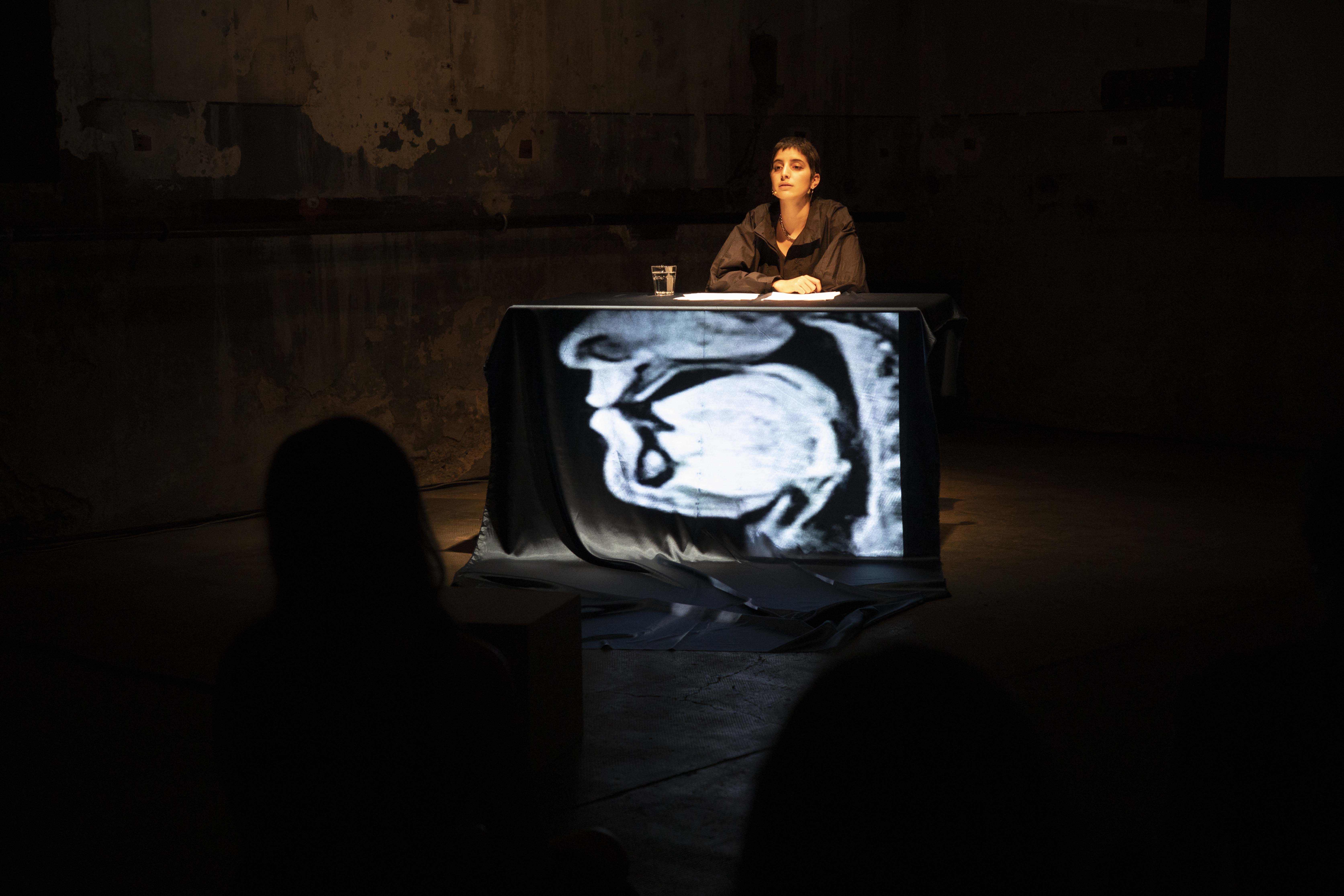
The selected proposal:
Dina’s performance, Grinding the Wind, navigates the missing parts of the story of her great-grandfather, who underwent medical testing and heart surgery at the Israeli military hospital Tel Hashomer in 1969. She went on a journey into archives, oral histories, dreams, and books. As she explains, “Like a surgeon who has wet dreams of inserting a finger into a heart during surgery, my research around the performative aspects of open-heart surgery is also motivated by desire. The heart of my great-grandfather, sealed behind more than one hundred stitches from his chest to his waist, was reduced to ashes as his final gesture of self-immolation.” Facing the mystery of this now inaccessible “archive,” for this new project the artist probes for clues to understand his descent into silence and protest, and ultimately into death.
Dina’s performance was presented at Alkantara festival in November 2020 and Kunstenfestivaldesarts in May 2021.

Haig Aivazian (b. 1980) lives and works in Beirut, Lebanon. Working across a range of media and modes of address, he delves into the ways in which power embeds, affects, and moves people, objects, animals, landscape, and architecture. Haig has explored apparatuses of control and sovereignty at work in sports, museums, and music.
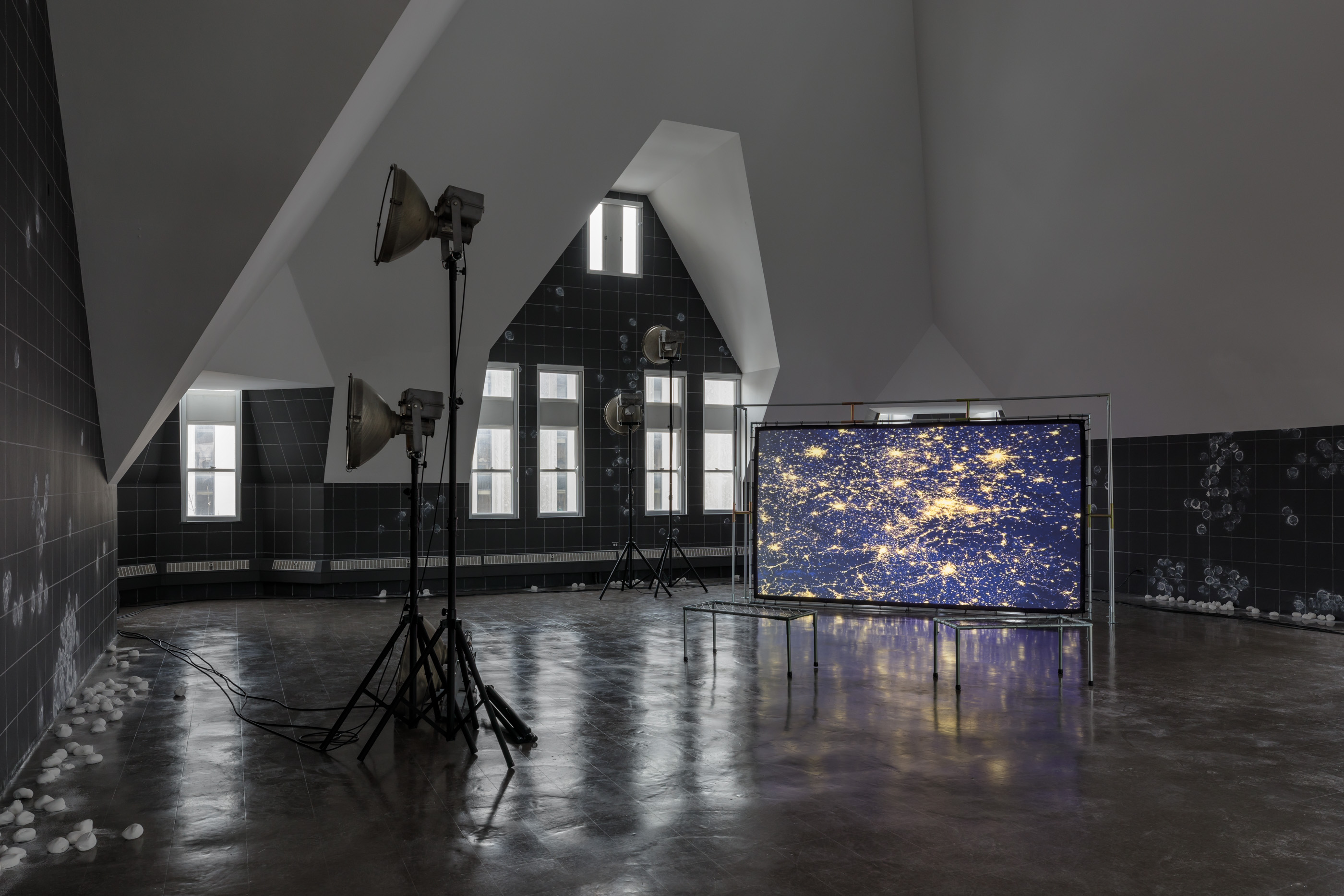
The selected proposal:
The sovereign is scared of the dark. In centuries past, his watchmen patrolled the streets, but could only punish the criminals they happened upon. Citizens out and about after dark were required to hold lanterns, the equivalent of carrying I.D today. Eventually the police would brighten the city to curb crime, and today, nobody refers to public lighting as police lights anymore. But if the sovereign giveth light, he can sure as hell withdraw it. He floods public space with luminary policing, but he legislates when it is time for his subjects to retreat into domesticity too. “Lights out!” he says to those under curfew or in incarceration. All of the Lights is an associative genealogy of the administration of light and darkness. Haig’s new film does not seek to shed light so much as it speculates about what remains unseen during the very act of shedding light.
Haig’s project has been shown at the Renaissance Society in December 2020 and will be presented at the Showroom in January 2022.

Inas Halabi (b. 1988) is an artist and filmmaker from Jerusalem, Palestine. Her practice is concerned with how social and political forms of power are manifested and the impact that suppressed or overlooked histories have on contemporary life. She holds an MFA from Goldsmiths, University of London and recently completed a two-year residency program at De Ateliers in Amsterdam. In 2016, she was awarded first prize for the A.M. Qattan Foundation’s Young Artist of the Year. Recent exhibitions and screenings include The Mosaic Rooms, London; TENT, Rotterdam; De Ateliers, Amsterdam; Silent Green Betonhalle, Berlin; Smith College Museum of Art, USA; Alte Fabrik, Rapperswil; Al-Ma’mal Foundation for Contemporary Art, Jerusalem; OFF-Biennale Budapest, and the 13th Sharjah Biennial’s Offsite project, Shifting Ground. She lives and works between Palestine and the Netherlands.
The selected proposal:
Inas’ new film, We No Longer Prefer Mountains, will be filmed in the Druze town of Dalyet al-Carmel, in northern Palestine, pulling the viewer into a surreal world of geographic isolation, shrouded mysticism and a locale shaped by co-optation, coercion, and control. Weaving together intimate engagements with members of the community, in shared domestic spaces and outdoor environments, the film sets out to explore how the inner politics of the Druze have been controlled and reshaped by the powers of the state since 1948. The film is unscripted and opens up a space to deal with situations where cameras may also be directed by the protagonist. One possible protagonist is a retired soldier, subsequently a judge, and presently a sheikh; his story uncovers layers of the legal, the stately, and the spiritual. Structurally inspired by Masao Adachi’s fukeiron or landscape theory, the film also surveys landscapes as clues for dominant political power and violence.
Inas’ project will be shown at The Showroom in April 2022 and De Appel in June 2022.
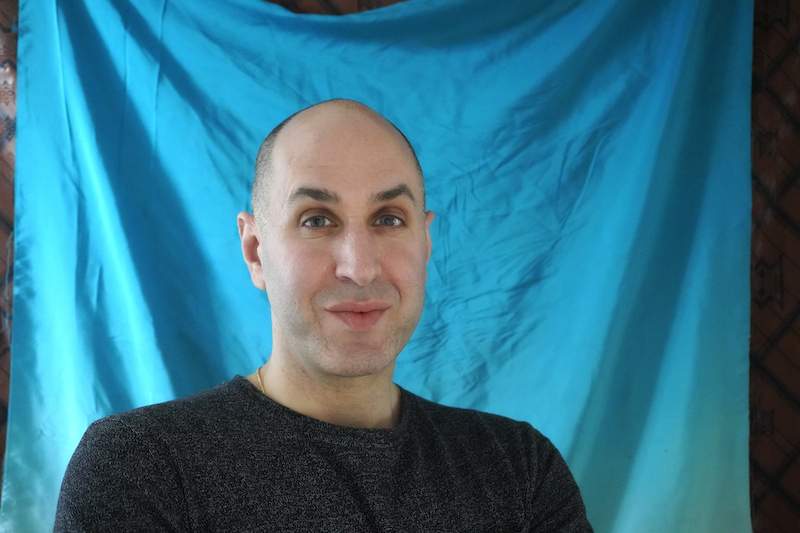
Joe Namy (b. 1978), based between Beirut and London, is an artist, educator, and composer, often working collaboratively and across mediums — in performance, sculpture, photography, text, video, and installation. His projects often focus on the social constructs of music and organized sound, such as the pageantry and geopolitics of opera, the noise laws and gender dynamics of bass, the colors and tones of militarization, the migration patterns of instruments and songs, and the complexities of translation in all this — from language to language, from score to sound, from drum to dance. Joe graduated with an MFA from New York University, and has independently studied jazz, Arabic music, and heavy metal drumming. He was a participant in the inaugural Ashkal Alwan Home Workspace independent study program, where he now teaches. His work has been exhibited, screened, and amplified at Art Night London, the Asia Culture Center in Gwangju, the Berlinale, the Brooklyn Museum, the Beirut Art Center, the Detroit Science Center, La Biennale de Montreal, Nottingham Contemporary, Sharjah Biennial 13, and other festivals, radio stations, and dance floors.
The selected proposal:
Disguised as a Dance Floor is an installation and performance based on the politics of bass and the subversive role of loud music and its effect on the body. Based on personal experiences and collective stories of empowerment, movement, and expression, and through an improvised and collaborative series of scores and sets, this project creates a space for new ways of listening with the body — situations for gestures, sounds, words to mingle in ways that haven’t been previously accessible in thinking about the history of art in relation to dance floors, and ways in which violence or solidarity have resonated on the dance floor.
With special thanks to BUDA Kunstencentrum in Kortrijk for hosting the artist and his collaborators for a development residency in January 2020.
Joe’s performance is taking place at Portikus in January 2022 and the Renaissance Society in April 2022.
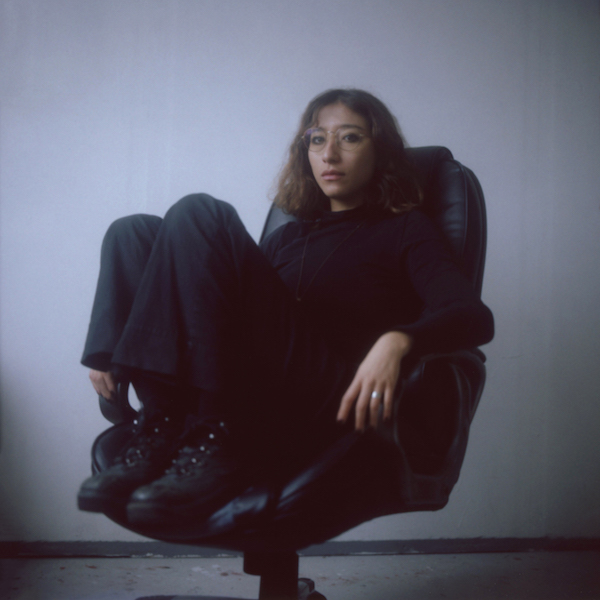
Lydia Ourahmane (b. 1992), is a multidisciplinary artist based in Algiers. Her research-driven practice explores major geopolitical issues of our time testing the permeability of boundaries and the state of being in-between. Her work in recent years has built on complex histories of colonialism, migration, and abstraction in a poetic exploration of the present, the personal, and the political. She graduated from Goldsmiths, University of London in 2014 and has exhibited internationally. Recent exhibitions include: Homeless Souls, Louisiana Museum of Modern Art, Denmark; Crude, Jameel Art Center, Dubai; Manifesta 12, Palermo; Jaou, Tunis; Droit du sang, Kunstverein München, Munich; 2018 New Museum Triennial: Songs for Sabotage, New Museum, New York; The You In Us, Chisenhale Gallery, London.
The selected proposal:
Lydia’s new project City of Demons begins with a pilgrimage to Tassili N’ajjer, a vast desert plateau on the border of Algeria and Libya which is home to over 15,000 ancient cave paintings and remains one of the last places on earth to refuse militarization, due to the hostility of its environment. The journey through this difficult-to-navigate terrain will be led by a guide, Ahmed, whose family were amongst the last of the Tuareg tribe to be moved from the plateau in 1985. Currently, collaborators include Amine Ali Pacha, Sophia Al-Maria, Alana Mejia Gonzalez, Hiba Ismail, and Nicolas Jaar.
Lydia’s project has been shown at De Appel in September 2021 and at Portikus in December 2021.
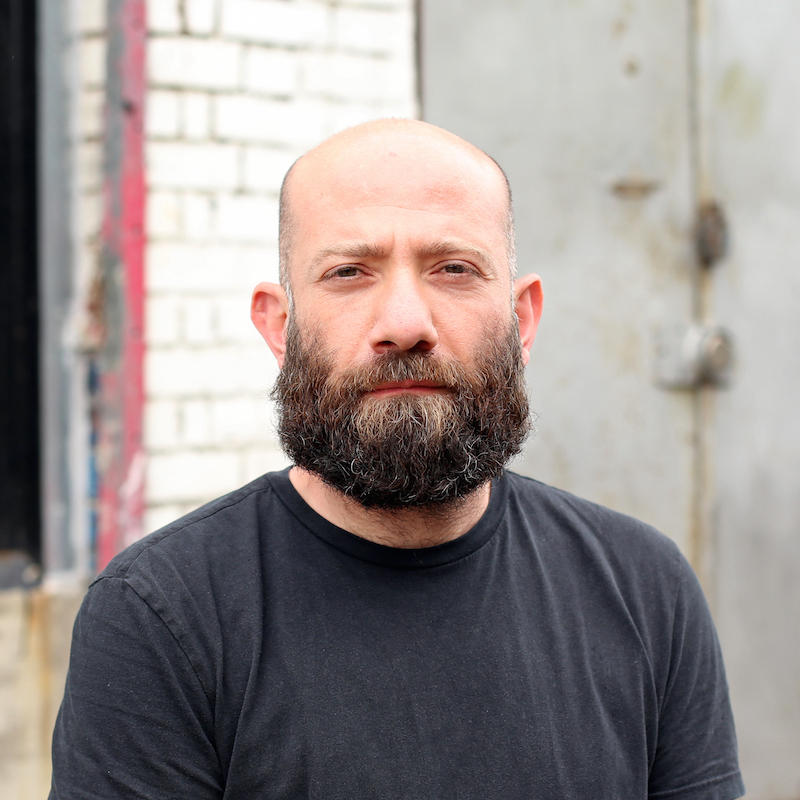
Ma’an Abu Taleb (b. 1981, Amman) is a Palestinian novelist, essayist, and cultural editor. He is the founding editor of Ma3azef, the Arab world’s leading online music magazine. Ma’an earned a master’s degree in philosophy and contemporary critical theory from the Centre for Research in Modern European Philosophy, Kingston University, London. His dissertation, titled The Phenomenology of Time: A Confrontation between Hegel’s Dialectics and Heidegger’s Ontology, was supervised by Catherine Malabou, philosopher and author. His debut novel, All the Battles, was released to critical and popular acclaim in 2016. He lives and works in London.
The selected proposal:
Ma’an’s project is the writing and staged reading of a play titled 1932, which tells the story of the first and last Congress of Arab Music that took place in Cairo in 1932 and is to this day seen as a landmark event in the history of Arabic music. The aim of the congress was to modernize and standardize Arabic music and took place during a period that is now considered to be the highest achievement of Arabic music, often referred to as the music of the Arab Renaissance. Although it was considered a success, the congress which did not involve any musicologists from the Arab world, never reconvened. A revisiting of this congress presents an opportunity to tell a story of culture and identity in the Arab world, infused with the intrigues and tragedies of kings, set against the influence of colonialism.
Ma’an’s staged reading took place at Mousonturm in August 2022, and will be shown at Kunstenfestivaldesarts in May 2022 and at Alkantara in November 2022.
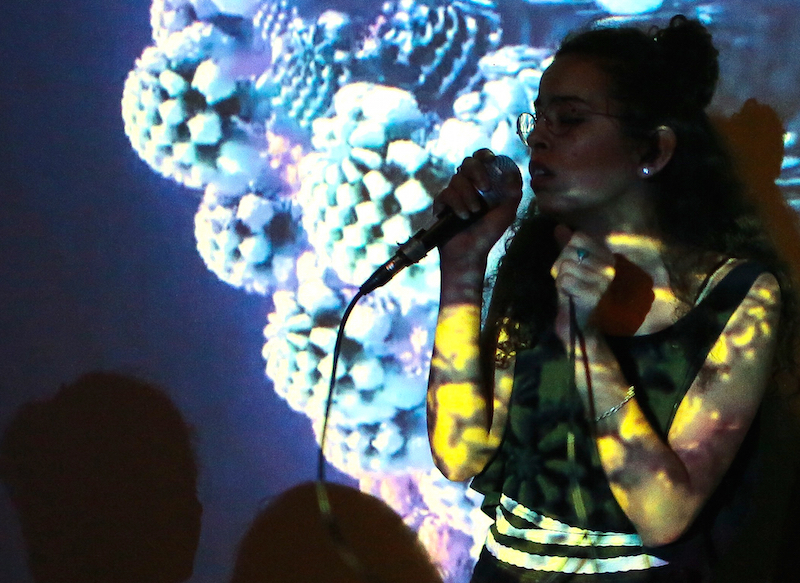
Makimakkuk (b. 1988) is a singer, MC, DJ, music maker, and artist. Makimakkuk’s sound is inspired by various musical genres such as hip-hop, folk, experimental, drum and bass, footwork, as well as freestyle and improvisation with an abstract, serious, and at the same time sarcastic lyrical approach to different personal, social, and political issues. She has performed and participated in a number of events, including Re|Sound III as part of Ma3azef’s Symposium on Arabic Music in collaboration with Sharjah Art Foundation; Boiler Room Palestine (Ramallah); SN8 (Berlin); and Nicolas Jaar’s closing act (Ramallah). She has participated in the Qattan Foundation’s Cité des arts Paris art residency; Anna Lindh Foundation, and Centre Culturel de Rencontre Abbaye de Neumünster art residency in 2014 where she released her first EP Fada’ with Luxembourgish producer Sunglitters. She started writing original songs in 2007 and has been active ever since in the independent music scene of Ramallah, Palestine.
Selected proposal to be presented at Ancienne Belgique in Brussels and Kulturen der Welt in Berlin:
Alien Nation by Makimakkuk is a live music performance project that focuses on the concept of alienation and the complex relationship between individual and universe. When in conflict with reality, an individual’s consciousness, as well as whole societies, can become alienated from their environment leading to isolation from or dispute with their universal surroundings. Alien Nation is the continuation of Makimakkuk’s research into supporting traumatized generations. At what point do they realize they still have a chance and bounce back? Where do they find the desire, will, and courage to be true to who they are while keeping their senses open to the universe? The performance includes original electronic compositions, singing, spoken-word, music samples, and sonic objects, each of which has a subject/topic that sonically triggers a memory or feeling from the performer.
Makimakkuk will be performing at Ancienne Belgique in spring 2022, and at Haus der Kulturen der Welt in summer 2022.
About the partners
The Alkantara Festival is a biennial performing arts event that brings together artists with singular visions of our world and our times. In addition to the festival, Alkantara runs a year-long program of residencies, workshops, research projects, and presentations at its studio and office space, Espaço Alkantara. Carla Nobre Sousa and David Cabecinha are the curators of the Consortium Commissions presentations at Alkantara Festival.
The Ancienne Belgique is a concert hall for contemporary music. It is one of the leading concert venues in Belgium, introducing interesting new and established artists to a broad range of music enthusiasts. Kurt Overbergh is the curator of the Consortium Commissions presentation at Ancienne Belgique.
De Appel is a contemporary art institute that brings together people, objects, and ideas to explore the unknown. With an experimental, open-minded, and inclusive focus, the programs of De Appel serve the intellectually and emotionally curious, (non-) specialized art enthusiasts, as well as seasoned art professionals. De Appel organizes exhibitions, performances, film screenings, lectures, and gatherings that cross boundaries between the arts and other disciplines. It is home to a curatorial program and an extensive archive and library. Monika Szewczyk is the curator of the Consortium Commissions presentations at De Appel.
The Haus der Kulturen der Welt presents arts from around the globe, with a particular focus on non-European cultures and societies. It displays projects that aim to challenge and break through artistic boundaries. Visual and performing arts, music, literature, film, academic discussions, and digital media are brought together in an interdisciplinary program that is unique in Europe. Detlef Diederichsen is the curator of the Consortium Commissions presentations at Haus der Kulturen der Welt.
Kunstenfestivaldesarts is an international arts festival dedicated to contemporary theater, performance, and dance. It occasionally also opens itself to film and visual arts. The festival explores hybrid and unconventional forms, and always addresses these fundamental questions: What can live on stage mean today? Who is represented? Who’s watching, who’s experiencing this live moment? Daniel Blanga Gubbay and Dries Douibi are the curators of the presentations at Kunstenfestivaldesarts.
Portikus is an institution for contemporary art in Frankfurt am Main. Since its foundation in 1987 as a fundamental element of the renowned art academy Städelschule, Portikus has been dedicated to exhibiting, publishing, and discussing both emerging and established artists and their work. With at least five exhibitions a year, Portikus presents a multitude of artist practices in group shows and solo presentations from a broad international background. Christina Lehnert is the curator of the Consortium Commissions presentations at Portikus.
The Renaissance Society at the University of Chicago presents contemporary art exhibitions, events, and publications. “The Ren,” as it is known, is an independent, non-collecting museum driven by an uncompromising commitment to artists and their ideas. Karsten Wales Lund is the curator of the presentations at The Renaissance Society.
Established in 1983, The Showroom is a center for contemporary art focused on a collaborative and process-driven approach to production, that challenges what art can be and do for a wide range of audiences, including art professionals and its local community. Elvira Dyangani Ose is the curator of the presentations at The Showroom in London.
Spielart has been exploring and researching new trends in the international theater world since 1995 in order to introduce them to audiences in Munich every two years. It is always about questioning the theater itself as an art form, constantly re-exploring or justifying it from its peripheral areas. Sophie Becker is the curator of the presentations at Spielart Festival.
Consortium Commissions 2020/2022 is implemented with the support of Mophradat’s institutional partners, and with additional support provided by the Foundation for Arts Initiatives (FfAI) and the Stavros Niarchos Foundation (SNF).
The Consortium Commissions 2020/22 is implemented with the support of Mophradat’s institutional partners, and with additional support provided by the Foundation for Arts Initiatives (FfAI) and the Stavros Niarchos Foundation (SNF).
